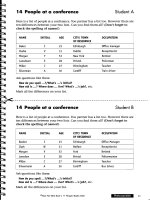20569 13 questions 3 amareis dodoes havehas pair work
Bạn đang xem bản rút gọn của tài liệu. Xem và tải ngay bản đầy đủ của tài liệu tại đây (104.7 KB, 2 trang )
-----------------------------------------------------------------------1. What …………… you going to do tonight?
-----------------------------------------------------------------------1. …………… you sitting in an armchair?
2. …………… you ever go camping?
2. …………… you American?
3. What …………… you mother doing right now?
3. …………… you ever been abroad?
4. …………… you have any friends from abroad?
4. What …………… you wearing?
5. …………… you ever eaten frogs’ legs?
5. What …………… the nickname for Bangkok?
6. What …………… the nickname for New York?
6. …………… you speak Japanese?
7. …………… the teacher wearing glasses?
7. …………… the teacher have a beard?
8. …………… your father smoke?
8. …………… you prefer the beach or the mountains?
9. …………… you prefer coffee or tea?
9. How many strings …………… a guitar have?
10. How many keys …………… a piano have?
10. Which …………… more expensive: silver or gold?
11. Which city …………… bigger: Bangkok or Rome?
11. …………… your mother like classical music?
12. …………… your best friend ever given you flowers?
12. Where …………… Aborigines live?
13. …………… cars drive on the left or the right?
13. …………… you left-handed?
Student A
Student B
-----------------------------------------------------------------------1. are
-----------------------------------------------------------------------1. are
2. do
2. are
3. is
3. have
4. do
4. are
5. have
5. is (the Big Mango)
6. is (the Big Apple)
6. do
7. is
7. does
8. does
8. do
9. do
9. does (six)
10. does
10. is (gold)
11. is (Bangkok)
11. does
12. has
12. do (Australia)
13. do (answers may vary depending on country)
13. are
Student A
Teacher’s notes
Two sets of 13 elementary
questions that can be used to
practise or reinforce basic verb
tenses (be/do). Give students
some time to prepare and then
let them practise in pairs. They
should not show each other their
questions; this doubles as a
listening exercises. Encourage
students to answer the questions
as well as they can. Follow-up
questions should be encouraged.
This worksheet focuses on
personal information and general
knowledge.
Student B









